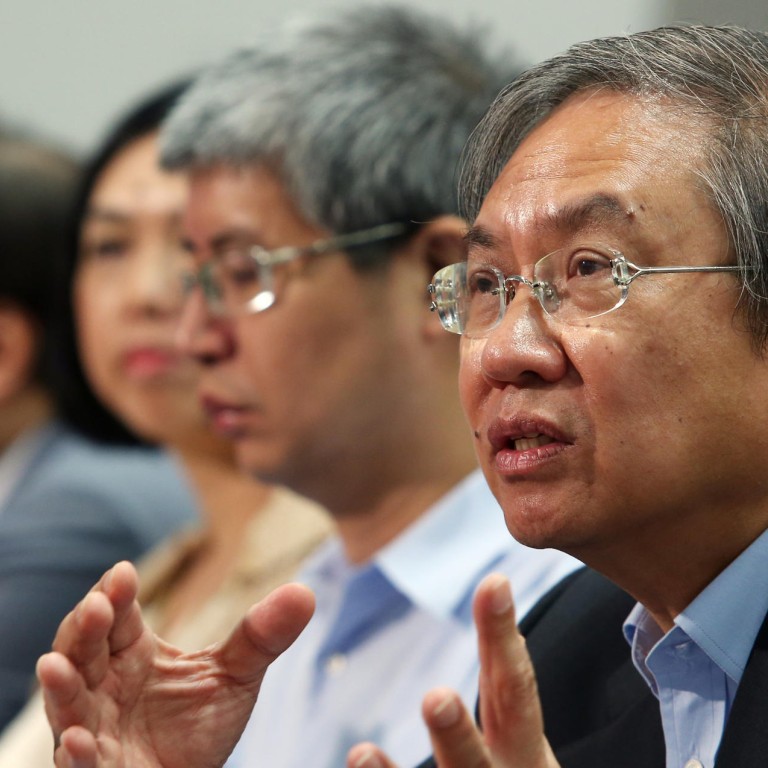
2017 proposals to elect chief executive may not be in line with Basic Law
Members of the pro-Beijing camp express their reservations about the pan-democrats' ideas for mass involvement in nominating committees
Key Beijing-loyalist lawmakers are taking a cautious approach to pan-democratic proposals for electing the city's next leader by universal suffrage in 2017.
The biggest pro-establishment party, the Democratic Alliance for the Betterment and Progress of Hong Kong, expressed reservations about whether the three proposals might fall foul of the Basic Law, but was less critical than some others in the camp.
At the centre of the debate is a suggestion to let 3.2 million ordinary voters citywide nominate, on top of voting for, their leader by 2017, through an exercise to garner signatures from 2 per cent of that population.
Earlier, Beijing-loyalist lawmakers warned that the idea might conflict with the Basic Law or the stance the national legislature took in 2007, dimming its prospects of winning enough backing in the Legislative Council.
In 2007, the National People's Congress Standing Committee decided that the chief executive may be elected by universal suffrage in 2017, "upon nomination by a broadly representative nominating committee in accordance with democratic procedures" as stipulated in the Basic Law.
The Alliance for True Democracy, comprising 26 of the 27 pan-democratic lawmakers, presented the proposals yesterday, saying they were drafted to meet world standards of democracy.
In response to that claim, DAB chairman and lawmaker Tam Yiu-chung declined to judge whether the proposals would contradict Hong Kong's mini-constitution.
It may be problematic … and we have to think about it because the idea [of involving millions of voters to nominate] is not found in the Basic Law
"I don't want to make such a [judgment]," he said. "It may be problematic … and we have to think about it because the idea [of involving millions of voters to nominate] is not found in the Basic Law."
Under the first proposal, district councillors would join the existing 1,193-strong Election Committee that elected Chief Executive Leung Chun-ying last year. When universal suffrage is put in place, that body will serve only as the nominating committee. Aspiring candidates who are nominated by 10 per cent of committee members will be able to contest the election, according to all three proposals.
Alternatively, they can automatically secure the committee's endorsement to join the ballot by collecting the signatures of 70,000 to 80,000, or 2 per cent, of the more than three million voters. Tam said "[the signatures] could be a point of reference … but the committee should have the power to decide [whether to endorse it]".
Party colleague and executive councillor Starry Lee Wai-king echoed his view. She believed that the pan-democrats' idea "may not be completely in line with the Basic Law".
Fellow pro-establishment politician Paul Tse Wai-chun, vice-chairman of the Legco constitutional affairs panel, said the proposals were worth considering.
"They may not be against the Basic Law … We should look at them more leniently," he said.
Chinese University political scientist Ma Ngok, who was among academics commissioned by the alliance to prepare the proposals, reiterated that since the legitimacy of the nominating committee was open to doubt, their recommendations could ensure that people with reasonable public support were allowed to enter the race.
Executive councillor Regina Ip Lau Suk-yee disagreed.
"People from different social classes and occupational backgrounds should be allowed to nominate," she said. [The candidacy] should not rely only on how many [signatures you get]."
Ip said she was certain that the proposed joint endorsement from 2 per cent of the voting population ran counter to the Basic Law.
Under the pan-democrats' two other proposals, the city will be divided into 20 constituencies to elect a 400-strong committee; or all legislators and district councillors will get seats on a 500-strong committee.
Various pan-democratic parties would seek public opinion before one concrete proposal was presented by the end of the year, the alliance said.

